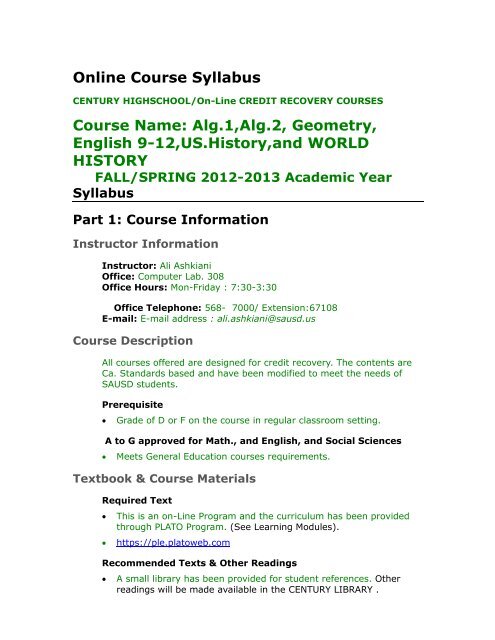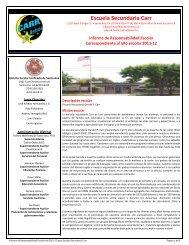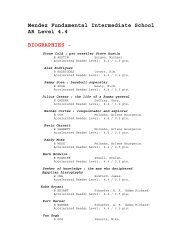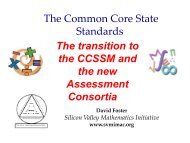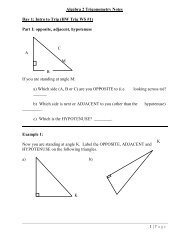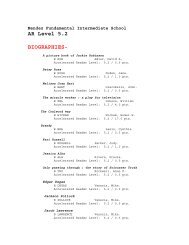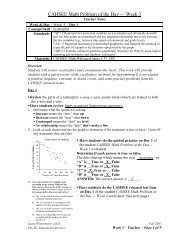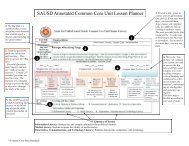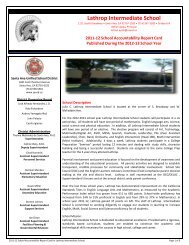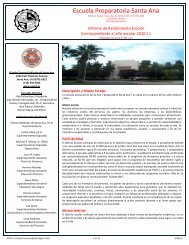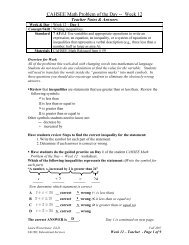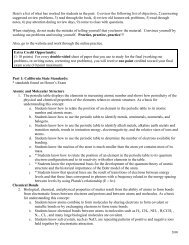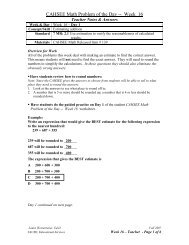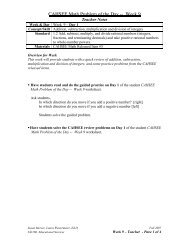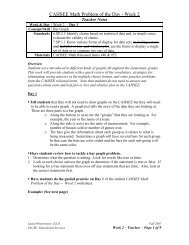Online Course Syllabus Template
Online Course Syllabus Template
Online Course Syllabus Template
Create successful ePaper yourself
Turn your PDF publications into a flip-book with our unique Google optimized e-Paper software.
<strong>Online</strong> <strong>Course</strong> <strong>Syllabus</strong><br />
CENTURY HIGHSCHOOL/On-Line CREDIT RECOVERY COURSES<br />
<strong>Course</strong> Name: Alg.1,Alg.2, Geometry,<br />
English 9-12,US.History,and WORLD<br />
HISTORY<br />
FALL/SPRING 2012-2013 Academic Year<br />
<strong>Syllabus</strong><br />
Part 1: <strong>Course</strong> Information<br />
Instructor Information<br />
Instructor: Ali Ashkiani<br />
Office: Computer Lab. 308<br />
Office Hours: Mon-Friday : 7:30-3:30<br />
Office Telephone: 568- 7000/ Extension:67108<br />
E-mail: E-mail address : ali.ashkiani@sausd.us<br />
<strong>Course</strong> Description<br />
All courses offered are designed for credit recovery. The contents are<br />
Ca. Standards based and have been modified to meet the needs of<br />
SAUSD students.<br />
Prerequisite<br />
<br />
<br />
Grade of D or F on the course in regular classroom setting.<br />
A to G approved for Math., and English, and Social Sciences<br />
Meets General Education courses requirements.<br />
Textbook & <strong>Course</strong> Materials<br />
Required Text<br />
<br />
<br />
This is an on-Line Program and the curriculum has been provided<br />
through PLATO Program. (See Learning Modules).<br />
https://ple.platoweb.com<br />
Recommended Texts & Other Readings<br />
<br />
A small library has been provided for student references. Other<br />
readings will be made available in the CENTURY LIBRARY .
CREDIT RECOVERY PLATO<br />
2012-2013 <strong>Syllabus</strong><br />
<strong>Course</strong> Requirements<br />
<br />
<br />
Internet connection (DSL, LAN, or cable connection desirable)<br />
Access to PLATO from home.<br />
<strong>Course</strong> Structure<br />
This course will be delivered entirely online through the course<br />
management system PLATO. You will use your Password account to<br />
login to the course from the Url Address: https://PLE.PLATOWEB.COM<br />
In PLATO, you will access online lessons, course materials, and<br />
resources. At designated times throughout the semester, we will<br />
participate in a blend of self-paced and group-paced activities using<br />
data bases and alternative Internet-based technologies. Activities will<br />
consist of chat, threaded discussions, discussion forums, email, off-line<br />
worksheets,wikis, and web posting.<br />
PLATO Access<br />
This course will be delivered partially online through a course<br />
management system named PLATO.COM. Off-line lessons and<br />
activities are also included in the program.<br />
To access this course on PLAT you will need access to the Internet and<br />
a supported Web browser (Internet Explorer, Firefox, Safari). To<br />
ensure that you are using a supported browser and have required<br />
plug-ins please run the Check Browser from your PLATO course<br />
Technical Assistance<br />
If you need technical assistance at any time during the course or to<br />
report a problem with Log-IN you can ask your teacher Mr. Ashkiani or<br />
the lab technicians if they are available:<br />
<br />
<br />
<br />
<br />
Visit the PLATO Messages Tab<br />
Review PLATO Discussion Tab<br />
Visit the PLATO Tutorial<br />
Submit a Message to Drop Box<br />
Important Note: This syllabus, along with course assignments and due<br />
dates, are subject to change. It is the student’s responsibility to check<br />
Messages for corrections or updates to the syllabus. Any changes will be<br />
clearly noted in course announcement or through PLATO email.
CENTURY HIGH SCHOOL/ON-Line Program<br />
ONLINE CREDIT RECOVERY<br />
2012-2013 <strong>Syllabus</strong><br />
Part 2: <strong>Course</strong> Objectives<br />
Objective 1:The course has been designed to assist students with<br />
credit deficiency to earn the missed credits and go back on graduation<br />
track.<br />
<br />
<br />
Objective 2:This class will assist students to improve their GPA,<br />
thus place them on track to graduation<br />
Objective 3:The class will help students experience on-line learning<br />
in general for their future higher education plans.<br />
You will meet the objectives listed above through a combination of the<br />
following activities in this course:<br />
Through consistent effort to stay on task and at least work for 45<br />
Minutes on the curriculum each session.<br />
Working on the lessons from home.<br />
Most objectives be met through examination, Mastery Tests, Activities,<br />
projects, and other requirements stated by your teacher.<br />
<br />
<br />
<br />
Attendance: You must attend class on time and on regular basis to<br />
meet and maintain your successful status.<br />
Complete all the tutorials , pre-tests, post-tests, unit activities and<br />
End of Semester Tests.<br />
Participate in course activities and print the worksheets to complete<br />
at home as homework.<br />
NOTE: You must earn a grade of 80% to pass these courses.
Department/College<br />
<strong>Course</strong> Name<br />
Semester <strong>Syllabus</strong><br />
Part 3: Topic Outline/Schedule<br />
Important Note: Refer to the course calendar for specific meeting dates<br />
and times. Activity and assignment details will be explained in detail within<br />
each week's corresponding learning module. If you have any questions,<br />
please contact your instructor.<br />
<br />
<br />
<br />
<br />
<br />
Week 01: Topic<br />
o Tutorial<br />
Week 02: Topic<br />
o Unit 1 Pre-Test<br />
Week 03: Topic<br />
o Module 1<br />
Week 04: Topic<br />
o Lessons 2 &3<br />
Week 05: Topic<br />
o Post-Test<br />
ALTERNATE FORMAT:<br />
Week Topic Readings Activities Due Date<br />
1<br />
2<br />
3<br />
4<br />
Note about calendar/schedule. While it is important to clearly follow the<br />
indicate schedule for your course, there are many places where you may<br />
speak to me to extend the time for completion of that module . You may see<br />
a topic outline/schedule (like the examples shown above) in your Messages<br />
Tab, to see a separate link to a schedule document in your Plato course.<br />
Regardless of which you choose, be consistent, and follow your calendar upto-date<br />
to help yourself follow along, reduce confusion, and increase your<br />
time on task.
CENTURY<br />
<strong>Course</strong> Name: Credit Recovery(PLATO)<br />
2012-2013 <strong>Syllabus</strong><br />
Part 4: Grading Policy<br />
Graded <strong>Course</strong> Activities<br />
Visit the Assignments link in Plato for details about each assignment<br />
listed below. Click on Assessments to access quizzes and exams.<br />
(See Part 4 for more information about accessing tools and activities).<br />
Points<br />
Completion of all<br />
Learning Modules:<br />
10% of the Grade<br />
#Unit Mastery<br />
Tests:40%<br />
End of Semester<br />
Test: 50%<br />
Description<br />
Item 1 (A activities, tests, etc. will determine<br />
the students’ final grade)<br />
All Mastery Tests must be taken and 80% is<br />
required, unless computer exempts you<br />
Total Points Possible: 100%<br />
Late Work Policy<br />
Example: Be sure to pay close attention to deadlines—there will be no<br />
make up assignments or quizzes, or late work accepted without a<br />
serious and compelling reason and instructor approval.<br />
Viewing Grades in SacCT<br />
Points you receive for graded activities will be posted to the SacCT<br />
Grade Book. Click on the My Grades link on the left navigation to view<br />
your points.<br />
Include a statement about the timeframe of when to look for grades.<br />
Example: Your instructor will update the online grades each time a<br />
grading session has been complete—typically X days following the<br />
completion of an activity. You will see a visual indication of new grades<br />
posted on your SacCT home page under the link to this course.<br />
Letter Grade Assignment<br />
Include an explanation between the relationship of points earned and<br />
final letter grade. Example: Final grades assigned for this course will<br />
be based on the percentage of total points earned and are assigned as<br />
follows:
<strong>Course</strong> Name<br />
Semester <strong>Syllabus</strong><br />
Letter Grade Percentage Performance<br />
A 90-100% Excellent Work<br />
B 80-89% Very Good Work<br />
C 70-79% Average Work<br />
D 60-69% Poor Work<br />
F 0-59% Failing Work<br />
Important note: For more information about grading at Century, visit<br />
with your counselor or me<br />
<strong>Course</strong> Name<br />
Semester <strong>Syllabus</strong><br />
Part 5: <strong>Course</strong> Policies<br />
Participation<br />
Students are expected to participate in all online activities as listed on<br />
the course calendar. All Mastery Tests must be completed and passed<br />
with at least 80% to be ready for END OF COURSE FINAL TEST.<br />
Student progress is tracked daily and discussed with you on Friday of<br />
each week . Student score for participation is already included in the<br />
completion of each module. You will get 10% of your grade for this<br />
task. I keep track of your log-in and the duration of working on Plato<br />
on regular basis. Students should be accessing the course<br />
approximately three minutes after the tardy bell, and actively engaged<br />
on task. I will be using tracking software, discussions, chat sessions,<br />
and group work, to monitor your participation in the course.<br />
Build Rapport<br />
If you find that you have any trouble keeping up with assignments or<br />
other aspects of the course, make sure you let your instructor know as<br />
early as possible. As you will find, building rapport and effective<br />
relationships are key to becoming an effective professional. Make sure<br />
that you are proactive in informing your instructor when difficulties<br />
arise during the semester so that we can help you find a solution.
<strong>Course</strong> Name<br />
Semester <strong>Syllabus</strong><br />
Complete Assignments<br />
All assignments for this course will be submitted electronically<br />
through Platoweb unless otherwise instructed. Assignments must<br />
be submitted by the given deadline or special permission must be<br />
requested from instructor before the due date. Extensions will not be<br />
given beyond the semester end date of 01/25/2013, except under<br />
extreme circumstances and the directive of the school’s Director of<br />
Instruction.<br />
All discussion assignments must be completed by the assignment due<br />
date and time. Late or missing discussion assignments will affect the<br />
student’s grade.<br />
Understand When You May Drop This <strong>Course</strong><br />
It is the student’s responsibility to understand when they need to<br />
consider switching to another course, discussing the matter with their<br />
counselors from a course. Refer to the Sac State <strong>Course</strong> Schedule for<br />
dates and deadlines for registration. After this period, a serious and<br />
compelling reason is required to drop from the course. Serious and<br />
compelling reasons includes: (1) documented and significant change in<br />
work hours, leaving student unable to attend class, or (2) documented<br />
and severe physical/mental illness/injury to the student or student’s<br />
family.<br />
Commit to Integrity<br />
As a student in this course (and at this school) you are expected to<br />
maintain high degrees of professionalism, commitment to active<br />
learning and participation in this class and also integrity in your<br />
behavior in and out of the classroom.<br />
CENTURY Academic Honesty Policy & Procedures<br />
“The principles of truth and honesty are recognized as fundamental to<br />
a community of scholars and teachers. CENTURY, expects that both<br />
faculty and students will honor these principles, and in so doing, will<br />
protect the integrity of academic work and student grades.”<br />
Definitions<br />
At CENTURY, “cheating is the act of obtaining or attempting to obtain<br />
credit for academic work through the use of any dishonest, deceptive,<br />
or fraudulent means.”<br />
“Plagiarism is a form of cheating. At Century, “plagiarism is the use
<strong>Course</strong> Name<br />
Semester <strong>Syllabus</strong><br />
of distinctive ideas or works belonging to another person without<br />
providing adequate acknowledgement of that person’s contribution.”<br />
Important Note: Any form of academic dishonesty, including cheating and<br />
plagiarism, may be reported to the office of student services.<br />
<strong>Course</strong> policies are subject to change. It is the student’s responsibility to<br />
check with your teacher for corrections or updates to the syllabus. Any<br />
changes will be posted in Century Website.


